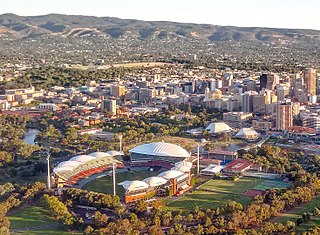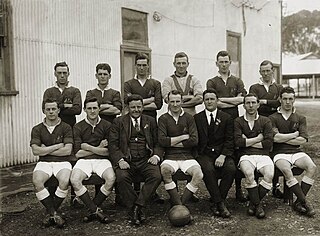
The Adelaide Oval is a sports ground in Adelaide in the state of South Australia. It is located in the parklands between the city centre and North Adelaide. The venue is predominantly used for cricket and Australian rules football, but has also played host to rugby league, rugby union, soccer, and tennis, as well as regularly being used to hold concerts.

The New Zealand men's national football team represents New Zealand in men's international football competitions. The team is governed by the governing body for football in New Zealand, New Zealand Football (NZF), which is currently a member of FIFA and the Oceania Football Confederation (OFC). The team's official nickname is the All Whites.

Reg Date was an Australian soccer player who plied his trade after the Second World War. Date played for Wallsend Football Club and Canterbury-Bankstown. He represented Australia in five full international matches, captaining three times.
Alex Gibb was an Australian soccer player who played half-back with Queensland clubs and the Queensland and Australia national teams. Gibb is recognised as Australia's first international captain, and was awarded Socceroo cap number one retrospectively in 2000 by Football Federation Australia, for Australia's first Test match against New Zealand, played in 1922.

Arthur "Jack" Verge was a rugby union player who represented Australia, New South Wales and Sydney University. Playing as a fullback, Verge won both his caps for Australia in 1904 against a touring team from the British Isles. Although he was relatively light for his position, he was repeatedly praised for his tackling and all-round defensive work, and in attack, he was a fast and deceptive runner. His kicking, on the other hand, was inconsistent.

Alfred Quill was an Australian soccer player and played for the Australia national team. Often considered one of the best soccer players in New South Wales, he scored 868 goals in all NSW competitions in his 24-year senior career.
The New Zealand women's national rugby league team, also known as the Kiwi Ferns or New Zealand Kiwi Ferns, represents New Zealand in women's rugby league. They are administered by the New Zealand Rugby League.
Frank Parsons was an Australian soccer player who played as a striker for the Australia national soccer team. He played his club football for Adamstown and Leichhardt-Annandale.
William "Podge" Maunder was an Australian soccer player. Maunder is recognised as the player who scored Australia's first international goal.
Percy Lennard (1900–1975) was an Australian soccer player.
The 1932 Great Britain Lions tour was a tour by the Great Britain national rugby league team) of Australia and New Zealand which took place between May and August 1932. The tour involved a schedule of 26 games, 18 in Australia including a three-test series against Australia for the Ashes and a further eight in New Zealand including a three-test series against New Zealand.
The 1936 Great Britain Lions tour was a tour by the Great Britain national rugby league team of Australia and New Zealand which took place between May and August 1936. The tour involved a schedule of 24 games, 16 in Australia including a three-test series against Australia for the Ashes and a further 8 in New Zealand including a two-test series against New Zealand.
George Smith was an Australian professional soccer player who played as a forward. He captained the Australia national soccer team in 1933. Often considered the best centre-forward in Australian soccer in the 1930s, he had an average of 2.66 goals per game for Australia and has had many goalscoring records throughout his 17-year career.
Alec Cameron was an Australian professional soccer player who played as a forward and captained the Australia national soccer team.
Henry Maunder was an Australian soccer player who played as full-back for Newcastle clubs and the Australia national team. His senior career varied between three clubs based in Newcastle; West Wallsend, Kurri Kurri and Wallsend. He won three Northern NSW Premierships and four Gardiner Cups.

This article summarises the Australia men's national soccer team in 1922.

This article summarises the Australia men's national soccer team in 1924.
This article summarises the Australia men's national soccer team in 1933.
This article summarises the Australia men's national soccer team in 1938.






